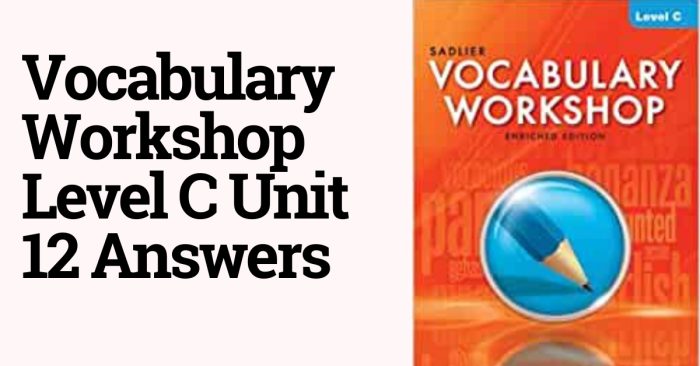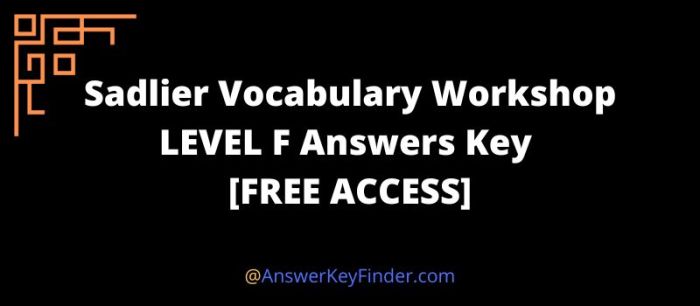Embark on an enthralling journey through Vocab Workshop Level C Unit 5, where we unlock the secrets of expanding your vocabulary with effortless ease. Join us as we delve into the art of word analysis, contextual understanding, and vocabulary practice, empowering you to master the nuances of language and elevate your communication skills.
Throughout this workshop, you’ll uncover strategies to enhance your vocabulary growth, master the art of word analysis, and harness the power of context to unlock the true meaning of words. We’ll provide practical examples, engaging activities, and proven techniques to help you achieve your vocabulary goals.
Vocabulary Development
Vocabulary development is the process of acquiring new words and understanding their meanings. It is an ongoing process that begins in childhood and continues throughout life. There are many different strategies that can be used to expand vocabulary, including reading, listening to new words, and using new words in conversation.
One of the most important things to remember when trying to expand your vocabulary is that context is key. Words often have different meanings depending on the context in which they are used. For example, the word “run” can mean to move quickly on foot, to operate a machine, or to compete in a race.
By understanding the context in which a word is used, you can better understand its meaning.
Strategies for Expanding Vocabulary
- Read widely and often. Reading exposes you to new words and helps you to learn how they are used in context.
- Listen to new words. When you hear a new word, try to figure out its meaning from the context. You can also look it up in a dictionary or online.
- Use new words in conversation. The best way to learn a new word is to use it in conversation. This will help you to remember the word and its meaning.
- Play word games. Word games are a fun way to learn new words and improve your vocabulary.
Activities that Promote Vocabulary Growth
- Keep a vocabulary journal. In your journal, write down new words that you encounter, along with their definitions and examples of how they are used.
- Use flashcards. Flashcards are a great way to memorize new words. Write the word on one side of the card and the definition on the other side.
- Take a vocabulary quiz. There are many different vocabulary quizzes available online. Taking a quiz can help you to assess your vocabulary and identify areas where you need to improve.
- Read aloud to children. Reading aloud to children is a great way to expose them to new words and help them to develop their vocabulary.
Word Analysis
Word analysis is a valuable tool for enhancing vocabulary. It involves breaking down words into their component parts to understand their meaning and usage.
After brushing up on your vocabulary with Vocab Workshop Level C Unit 5, it’s time to test your knowledge with our Topic 6 Final Assessment Quiz . Don’t worry if you’re feeling a bit rusty; this quiz is designed to help you identify areas where you need some extra practice.
So, head over to the quiz and see how well you’ve mastered the vocabulary from Vocab Workshop Level C Unit 5.
There are different types of word analysis, including:
Morphological Analysis
Morphological analysis examines the structure of words, including their prefixes, suffixes, and roots. By understanding how these elements combine, we can derive the meaning and relationship between words.
Semantic Analysis
Semantic analysis focuses on the meaning of words, including their denotation (literal meaning) and connotation (implied meaning). It also explores the relationships between words, such as synonyms, antonyms, and homonyms.
Etymology
Etymology investigates the origin and historical development of words. Understanding the etymology of a word can provide insights into its meaning and usage.
Syntactic Analysis
Syntactic analysis examines the grammatical structure of words, including their parts of speech and how they function within sentences. This helps us understand how words interact and convey meaning in context.
Contextual Analysis
Contextual analysis examines the meaning of words within specific contexts. By considering the surrounding text, we can better understand the intended meaning and usage of a word.
Word analysis enhances vocabulary by:
- Expanding our understanding of word meanings and usage
- Improving our ability to identify and use words effectively
- Enhancing our comprehension and communication skills
Contextual Understanding

Context plays a crucial role in vocabulary comprehension, providing essential clues that help us understand the meaning of unfamiliar words. It encompasses the surrounding words, sentences, and even the broader context of the text or situation.
By analyzing the context, we can infer the meaning of words based on their relationship to other known words, the topic being discussed, and the overall tone or purpose of the communication. For example, the word “liberty” can have different meanings depending on the context.
In a political context, it may refer to freedom from oppression, while in a personal context, it may indicate freedom of choice.
Strategies for Improving Contextual Understanding
To enhance contextual understanding, several strategies can be employed:
- Read actively:Pay attention to the surrounding words and sentences, and try to infer the meaning of unfamiliar words based on the context.
- Use context clues:Look for clues such as synonyms, antonyms, definitions, examples, or comparisons that provide hints about the meaning of the word.
- Analyze the structure:Consider the grammatical structure of the sentence and the word’s part of speech to narrow down its possible meanings.
- Use dictionaries and thesauruses:Consult dictionaries or thesauruses to verify your understanding of the word and explore its different meanings.
- Seek additional information:If necessary, consult other sources such as encyclopedias, websites, or subject-matter experts to gain a deeper understanding of the context.
Vocabulary Practice: Vocab Workshop Level C Unit 5

Incorporating vocabulary practice into the curriculum is essential for enhancing students’ language proficiency. By engaging in regular vocabulary exercises, students can expand their vocabulary, improve their comprehension, and enhance their communication skills.
To effectively integrate vocabulary practice, it’s crucial to organize activities based on difficulty levels, ensuring that students are challenged appropriately. This approach allows for gradual progression, building confidence and motivation as students master new words.
Categorizing Vocabulary Practice Methods
A comprehensive approach to vocabulary practice involves utilizing various methods, each offering unique benefits. The following table Artikels some commonly used methods and their advantages:
| Method | Benefits |
|---|---|
| Flashcards | – Portable and convenient for spaced repetition
|
| Word Walls | – Visual representation of vocabulary
|
| Contextual Reading | – Exposes students to vocabulary in authentic contexts
|
| Word Games | – Fun and engaging way to practice vocabulary
|
| Technology-Assisted Learning | – Interactive and multimedia-rich experiences
|
Assessment and Evaluation
Effective vocabulary development necessitates ongoing assessment to track progress and make necessary adjustments. Various methods are employed for this purpose, each with its own strengths and limitations.
Methods of Vocabulary Assessment
1. Informal Assessment:
- Observing student participation in class discussions and writing assignments.
- Using word games, puzzles, and other interactive activities to assess comprehension.
2. Formal Assessment:
- Vocabulary Tests:Objective tests that measure students’ understanding of word meanings, usage, and relationships.
- Portfolio Assessment:Collection of student work over time, including writing samples, projects, and self-reflections.
3. Technology-Based Assessment:
- Computer-Adaptive Tests:Adjust the difficulty of questions based on student responses, providing a personalized assessment.
- Online Vocabulary Games:Interactive and engaging games that assess vocabulary comprehension and usage.
Importance of Ongoing Vocabulary Assessment
Continuous vocabulary assessment is crucial for several reasons:
- Monitoring Progress:Tracking student progress over time helps identify areas of strength and weakness, allowing for targeted instruction.
- Feedback for Students:Assessment provides students with feedback on their vocabulary development, motivating them to improve.
- Adapting Instruction:Assessment results guide teachers in adjusting their teaching methods and materials to meet the specific needs of students.
Vocabulary Assessment Tools, Vocab workshop level c unit 5
Numerous tools are available to assist in vocabulary assessment:
- Standardized Vocabulary Tests:Commercially available tests that provide standardized scores and benchmarks.
- Classroom-Based Assessments:Developed by teachers to assess specific vocabulary concepts taught in class.
- Online Resources:Websites and apps that offer interactive vocabulary exercises, games, and assessments.
Technology Integration
Technology plays a pivotal role in vocabulary development by providing access to vast resources, interactive tools, and personalized learning experiences.
Technology tools such as online dictionaries, thesaurus, and language learning apps offer quick and easy access to definitions, synonyms, antonyms, and usage examples. Interactive games, quizzes, and exercises engage learners and make vocabulary practice more enjoyable and effective.
Online Dictionaries and Thesaurus
Online dictionaries provide comprehensive definitions, usage examples, and pronunciation guides. Thesaurus tools help expand vocabulary by suggesting synonyms, antonyms, and related words.
Common Queries
What is the primary focus of Vocab Workshop Level C Unit 5?
Expanding vocabulary, enhancing word analysis skills, and improving contextual understanding.
How can I benefit from completing this workshop?
You’ll gain practical strategies to increase your vocabulary, improve your reading comprehension, and enhance your communication skills.
Is this workshop suitable for all skill levels?
Yes, the workshop is designed to cater to learners of all levels, from beginners to advanced vocabulary users.
